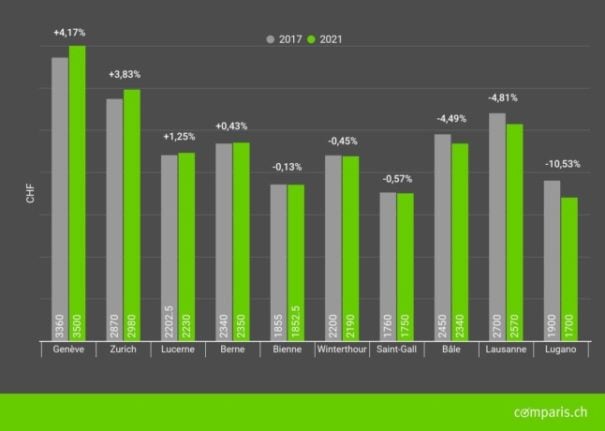EXPLAINED: Why rents are low and falling in Italian-speaking Switzerland

Despite high hopes, rents in Lugano have fallen considerably in recent years. Here’s what you need to know.
Lugano, in southern Switzerland, is not only the largest Italian-speaking city in the country but it is actually home to the largest Italian-speaking community outside Italy.
With some of Switzerland’s best weather and relatively easy access to Zurich, Milan and the Italian lake region, Lugano is one of Switzerland’s best placed cities.
In recent years, it has unofficially marketed itself as the best of both worlds - a city with both Italian flair and Swiss organisation.
However, since 2017, Lugano has seen its rents fall by more than 10 percent in all housing categories, according to Swiss comparison site Comparis.
It now has the cheapest rents of any of Switzerland's top ten cities, with an average of CHF1,700 per month.
Across the same period, other Swiss major cities like Zurich and Geneva averaged a four percent increase in rents.
REVEALED: The six major Swiss cities where rents are falling
The following chart shows how rents increased or decrease in ten Swiss cities over the past four years.

Image: Comparis
At a cantonal level, Ticino also ranks as one of the cheapest states in Switzerland to rent.
According to a new large-scale study carried out by Swiss Marketplace Group (SMG) in January 2022, the cantonal average of rents in Ticino is CHF1,470 per month - placing it in the top ten cheapest cantons to rent in the country.
The averages of urban areas like Lugano, Bellinzona and Locarno are brought down by those away from the cities.
Non-urban Ticino has some of the cheapest rental prices of anywhere in Switzerland, which is perhaps no surprise considering these areas are the location of Switzerland's 'one franc home' offers that pop up from time to time.
‘Impossible’: Why Switzerland’s one franc homes are too good to be true
A comparison of all 26 cantonal averages for renting a 3.5-room apartment can be seen in the following table from SMG.
Zug
2428
Geneva
2248
Zürich
2131
Basel-City
2029
Schwyz
1948
Nidwalden
1947
Vaud
1895
Lucerne
1777
Baselland
1767
Obwalden
1685
Aarau
1659
Graubünden
1591
Bern
1577
Thurgau
1570
Freiburg
1556
Appenzell Ausserrhoden
1539
St. Gallen
1537
Solothurn
1496
Schaffhausen
1483
Ticino
1470
Wallis
1440
Uri
1427
Glarus
1373
Appenzell Innerrhoden
1372
Neuchâtel
1343
Jura
1135
Brain drain and a muted economic recovery
Leo Hug, real estate expert at Comparis, said despite high hopes, several factors had contributed to Lugano’s rental decline.
The reasons, Hug said, are because “the hoped-for economic recovery thanks to faster [train] connections with the rest of Switzerland has not materialised so far”.
The population of Ticino's economic centre contracted by 2.1 percent between 2017 and the end of 2020, so rents are expected to decline further.
And the Lugano does not have the same appeal as Geneva, which can rely on its international organisations to attract foreign nationals, Hug said.
Another major reason for Lugano’s economic state is an ongoing ‘brain drain’, which has seen people in their 20s and 30s move elsewhere in search of better opportunities.
This does not only affect the local Lugano-born population, but also expats who move to Lugano but move on again afterwards.
Zurich is the main target for people leaving Lugano, with higher wages and better job opportunities found along the Limmat river.
In addition to Zurich, Lugano has seen a net decline in people leaving to Vaud, Bern, Lucerne, Graubünden and Fribourg across the past decade.
Comments
See Also
Lugano, in southern Switzerland, is not only the largest Italian-speaking city in the country but it is actually home to the largest Italian-speaking community outside Italy.
With some of Switzerland’s best weather and relatively easy access to Zurich, Milan and the Italian lake region, Lugano is one of Switzerland’s best placed cities.
In recent years, it has unofficially marketed itself as the best of both worlds - a city with both Italian flair and Swiss organisation.
However, since 2017, Lugano has seen its rents fall by more than 10 percent in all housing categories, according to Swiss comparison site Comparis.
It now has the cheapest rents of any of Switzerland's top ten cities, with an average of CHF1,700 per month.
Across the same period, other Swiss major cities like Zurich and Geneva averaged a four percent increase in rents.
REVEALED: The six major Swiss cities where rents are falling
The following chart shows how rents increased or decrease in ten Swiss cities over the past four years.

Image: Comparis
At a cantonal level, Ticino also ranks as one of the cheapest states in Switzerland to rent.
According to a new large-scale study carried out by Swiss Marketplace Group (SMG) in January 2022, the cantonal average of rents in Ticino is CHF1,470 per month - placing it in the top ten cheapest cantons to rent in the country.
The averages of urban areas like Lugano, Bellinzona and Locarno are brought down by those away from the cities.
Non-urban Ticino has some of the cheapest rental prices of anywhere in Switzerland, which is perhaps no surprise considering these areas are the location of Switzerland's 'one franc home' offers that pop up from time to time.
‘Impossible’: Why Switzerland’s one franc homes are too good to be true
A comparison of all 26 cantonal averages for renting a 3.5-room apartment can be seen in the following table from SMG.
| Zug | 2428 |
| Geneva | 2248 |
| Zürich | 2131 |
| Basel-City | 2029 |
| Schwyz | 1948 |
| Nidwalden | 1947 |
| Vaud | 1895 |
| Lucerne | 1777 |
| Baselland | 1767 |
| Obwalden | 1685 |
| Aarau | 1659 |
| Graubünden | 1591 |
| Bern | 1577 |
| Thurgau | 1570 |
| Freiburg | 1556 |
| Appenzell Ausserrhoden | 1539 |
| St. Gallen | 1537 |
| Solothurn | 1496 |
| Schaffhausen | 1483 |
| Ticino | 1470 |
| Wallis | 1440 |
| Uri | 1427 |
| Glarus | 1373 |
| Appenzell Innerrhoden | 1372 |
| Neuchâtel | 1343 |
| Jura | 1135 |
Brain drain and a muted economic recovery
Leo Hug, real estate expert at Comparis, said despite high hopes, several factors had contributed to Lugano’s rental decline.
The reasons, Hug said, are because “the hoped-for economic recovery thanks to faster [train] connections with the rest of Switzerland has not materialised so far”.
The population of Ticino's economic centre contracted by 2.1 percent between 2017 and the end of 2020, so rents are expected to decline further.
And the Lugano does not have the same appeal as Geneva, which can rely on its international organisations to attract foreign nationals, Hug said.
Another major reason for Lugano’s economic state is an ongoing ‘brain drain’, which has seen people in their 20s and 30s move elsewhere in search of better opportunities.
This does not only affect the local Lugano-born population, but also expats who move to Lugano but move on again afterwards.
Zurich is the main target for people leaving Lugano, with higher wages and better job opportunities found along the Limmat river.
In addition to Zurich, Lugano has seen a net decline in people leaving to Vaud, Bern, Lucerne, Graubünden and Fribourg across the past decade.
Join the conversation in our comments section below. Share your own views and experience and if you have a question or suggestion for our journalists then email us at [email protected].
Please keep comments civil, constructive and on topic – and make sure to read our terms of use before getting involved.
Please log in here to leave a comment.